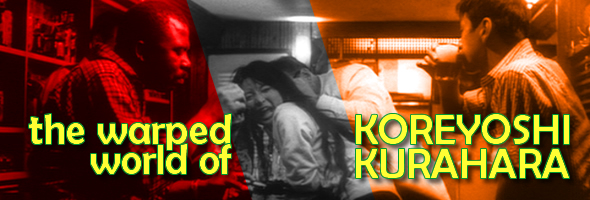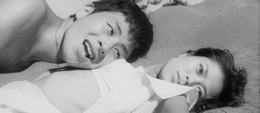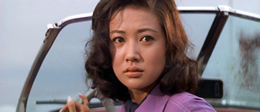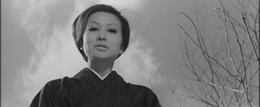
INTIMIDATION
B&W, 1960, 65m.
Directed by Koreyoshi Kurahara
Starring Nobuo Kaneko, Mari Shiraki, Akira Nishimura
THE WARPED ONES
B&W, 1960, 75m.
Directed by Koreyoshi Kurahara
Starring Tamio Kawachi, Eiji Go, Hiroyuki Nagato, Noriko Matsumoto, Kojiro Kusanagi
I HATE BUT LOVE
Color, 1962, 105m.
Directed by Koreyoshi Kurahara
Starring Y�jir� Ishihara, Ruriko Asaoka, Hiroyuki Nagato
BLACK SUN
B&W, 1964, 95m.
Directed by Koreyoshi Kurahara
Starring Tamio Kawachi, Chico Roland, Yuko Chishiro
THIRST FOR LOVE
B&W, 1967, 99m.
Directed by Koreyoshi Kurahara
Starring Ruriko Asaoka, Nobuo Nakamura, Tetsuo Ishidate
Criterion (DVD) (US R1 NTSC) / WS (2.35:1) (16:9)
 The incredibly prolific string of films generated by Japan's Nikkatsu Corporation in the 1960s before its legendary change of course into racier territory a decade later resulted in some amazing, wide-ranging directors capable of covering subjects ranging from brutal crime sagas to hopped-up juvenile delinquent films. Both of these extremes and more are represented in the five-film The Warped World of Koreyoshi Kurahara box set released under the auspices of Criterion's Eclipse Series banner, which has unleashed some astonishing, little-seen gems on the public in the past and continues to do itself proud here.
The incredibly prolific string of films generated by Japan's Nikkatsu Corporation in the 1960s before its legendary change of course into racier territory a decade later resulted in some amazing, wide-ranging directors capable of covering subjects ranging from brutal crime sagas to hopped-up juvenile delinquent films. Both of these extremes and more are represented in the five-film The Warped World of Koreyoshi Kurahara box set released under the auspices of Criterion's Eclipse Series banner, which has unleashed some astonishing, little-seen gems on the public in the past and continues to do itself proud here.
First up in the set is 1960's Intimidation (Aru Kyouhaku), a taut and tidy caper noir that clocks in at just over an hour and makes the most of its lean running time. Takita (Kaneko) is an ambitious banker on his way up the ladder who works in a branch with his gaunt, scrawny friend, Nakaike (The Bad Sleep Well's Nishimura), who keeps getting passed over for a promotion, When Nakaike discovers his buddy's been tampering with the books to pocket some cash on the side, the stage is set for blackmail and an elaborate central heist that leaves no one unscathed. Elegant in its nihilistic precision, this film has been cited several times as Japan's first real noir (three years before Kurosawa's masterful High and Low) and serves as a miniature master class in how to pull off a chilling heist film with a minimum of resources and lots of creativity.
 However, it's the next film in the set that became Kurahara's best-known title overseas from this period: The Warped Ones, originally released in America by Audubon Films as The Weird Lovemakers (a title it retained during its brief VHS tenure from Something Weird Video). Tamio Kawaji (Youth of the Beast) pulls out all the stops here as Akira, a ferocious teenager hellbent on kicks and picking pockets with the accompaniment of his friend Masaru (Go) and a maniacal young hooker, Fumiko (Matsumoto). Together they set out for revenge against the reporter who landed Akira in a reformatory, even molesting and kidnapping his girlfriend on the beach. Things continue to spiral out of control, reaching a fevered pitch at an abortion clinic where the whole world seems to come crashing down. Frenetic, outrageous, and fueled by an aggressive jazz score Toshir� Mayuzumi (The Bible), this film grabs you by the throat in the opening seconds and never lets go; there would certainly be later j.d. films, of course, including more than a couple in Britain starring Malcolm McDowell, but none are quite like this one.
However, it's the next film in the set that became Kurahara's best-known title overseas from this period: The Warped Ones, originally released in America by Audubon Films as The Weird Lovemakers (a title it retained during its brief VHS tenure from Something Weird Video). Tamio Kawaji (Youth of the Beast) pulls out all the stops here as Akira, a ferocious teenager hellbent on kicks and picking pockets with the accompaniment of his friend Masaru (Go) and a maniacal young hooker, Fumiko (Matsumoto). Together they set out for revenge against the reporter who landed Akira in a reformatory, even molesting and kidnapping his girlfriend on the beach. Things continue to spiral out of control, reaching a fevered pitch at an abortion clinic where the whole world seems to come crashing down. Frenetic, outrageous, and fueled by an aggressive jazz score Toshir� Mayuzumi (The Bible), this film grabs you by the throat in the opening seconds and never lets go; there would certainly be later j.d. films, of course, including more than a couple in Britain starring Malcolm McDowell, but none are quite like this one.
 The most conventional film of the set is certainly I Hate But Love, the only one in color; it's a pop-art showbiz chronicle about a celebrity DJ, Daisaku (Crazed Fruit's Ishihara), who's fed up with the Tokyo scene and decides to deliver a jeep to the countryside. His manager, Noriko (Goyokin's Asaoka), is aware that he has romantic designs on her and follows him to out of town, where his presence starts to create ripples among the local populace. A sincere soaper with beautifully saturated color designs and landscape shots, this film is far more upbeat than its title might indicate and features two very strong central performances anchoring what could have easily been TV movie-of-the-week material.
The most conventional film of the set is certainly I Hate But Love, the only one in color; it's a pop-art showbiz chronicle about a celebrity DJ, Daisaku (Crazed Fruit's Ishihara), who's fed up with the Tokyo scene and decides to deliver a jeep to the countryside. His manager, Noriko (Goyokin's Asaoka), is aware that he has romantic designs on her and follows him to out of town, where his presence starts to create ripples among the local populace. A sincere soaper with beautifully saturated color designs and landscape shots, this film is far more upbeat than its title might indicate and features two very strong central performances anchoring what could have easily been TV movie-of-the-week material.
 We then jump back to jazz-saturated Tokyo for Black Sun, a hyperactive, boderline avant garde, and very politically incorrect buddy picture of sorts with Kawaji returning as Mei, essentially a riff on his Warped Ones character, a thief living in the slums who uses his ill-gotten gains to maintain his jazz record collection. When he stumbles upon a wounded, gun-toting black American G.I., Gill (Roland), he's overjoyed at finding someone to fuel his music-fevered imagination; together they embark on a bizarre road trip that finds them both donning blackface and whiteface, cavorting with the apparently insane locals, and adorning their car with an increasing amount of ephemera. Truly bizarre and gorgeous to watch, Black Sun feels more like a proto-music video at times than a rational narrative film; the jazz score underscores the unusual structure of the film, including contributions from American drummer Max Roach, along with Abbey Lincoln and Clifford Jordan. (In a nifty in-joke, Mei -- also referred to as Akira, oddly enough -- has an ill-fated dog named Monk.)
We then jump back to jazz-saturated Tokyo for Black Sun, a hyperactive, boderline avant garde, and very politically incorrect buddy picture of sorts with Kawaji returning as Mei, essentially a riff on his Warped Ones character, a thief living in the slums who uses his ill-gotten gains to maintain his jazz record collection. When he stumbles upon a wounded, gun-toting black American G.I., Gill (Roland), he's overjoyed at finding someone to fuel his music-fevered imagination; together they embark on a bizarre road trip that finds them both donning blackface and whiteface, cavorting with the apparently insane locals, and adorning their car with an increasing amount of ephemera. Truly bizarre and gorgeous to watch, Black Sun feels more like a proto-music video at times than a rational narrative film; the jazz score underscores the unusual structure of the film, including contributions from American drummer Max Roach, along with Abbey Lincoln and Clifford Jordan. (In a nifty in-joke, Mei -- also referred to as Akira, oddly enough -- has an ill-fated dog named Monk.)
 The last film in the set is one of the least known and, in many respects, the most surprising; it's a macabre melodrama called Thirst for Love, adapted from a novel by the legendary Yukio Mishima (Black Rose Mansion). Recently widowed, young Etsuko (Asaoka again) lives in an oppressive, decaying estate with her father-in-law (Dagora's Nakamura), who imposes his sexual needs upon her. However, her eye wanders more to the young, boyish gardener (If You Were Young: Rage's Ishidate), who spends much of his time in the greenhouse. Tensions rise, passions simmer, and it all ends in spectacularly gory fashion with a scythe!
The last film in the set is one of the least known and, in many respects, the most surprising; it's a macabre melodrama called Thirst for Love, adapted from a novel by the legendary Yukio Mishima (Black Rose Mansion). Recently widowed, young Etsuko (Asaoka again) lives in an oppressive, decaying estate with her father-in-law (Dagora's Nakamura), who imposes his sexual needs upon her. However, her eye wanders more to the young, boyish gardener (If You Were Young: Rage's Ishidate), who spends much of his time in the greenhouse. Tensions rise, passions simmer, and it all ends in spectacularly gory fashion with a scythe!
All five films feature solid anamorphic transfers on par with the previous Eclipse titles of a similar vintage, especially their essential Nikkatsu Noir set. For some reason I Hate But Love is noticeably windowboxed, so you may want to keep the zoom button handy to adjust it a bit; all the B&W titles fill the horizontal frame to the edges and look great, while the optional English subtitles for each are excellent. The only extra is liner notes for each title by Asian film writer Chuck Stephens, including a more extensive director bio for the notes in Intimidation. Very highly recommended all around, especially if you watch the films in chronological order.
Reviewed on August 14, 2011.


 The incredibly prolific string of films generated by Japan's Nikkatsu Corporation in the 1960s before its legendary change of course into racier territory a decade later resulted in some amazing, wide-ranging directors capable of covering subjects ranging from brutal crime sagas to hopped-up juvenile delinquent films. Both of these extremes and more are represented in the five-film The Warped World of Koreyoshi Kurahara box set released under the auspices of Criterion's Eclipse Series banner, which has unleashed some astonishing, little-seen gems on the public in the past and continues to do itself proud here.
The incredibly prolific string of films generated by Japan's Nikkatsu Corporation in the 1960s before its legendary change of course into racier territory a decade later resulted in some amazing, wide-ranging directors capable of covering subjects ranging from brutal crime sagas to hopped-up juvenile delinquent films. Both of these extremes and more are represented in the five-film The Warped World of Koreyoshi Kurahara box set released under the auspices of Criterion's Eclipse Series banner, which has unleashed some astonishing, little-seen gems on the public in the past and continues to do itself proud here.



